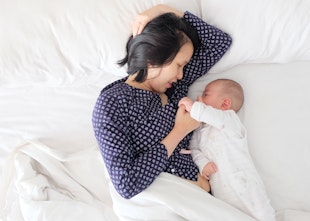The baby blues are a common feeling of sadness or in some cases, moodiness or irritability in the first few days after giving birth. They are a normal part of the challenging transition to motherhood.
Having a baby is a big adjustment with huge responsibilities and it's important every new mother understands the new role affects everyone differently.
Some mothers thrive from day one, others may swing between happiness and uncertainty whilst some may feel overwhelmed and anxious.
What causes the baby blues?
You can rest easy knowing that having the 'baby blues' is perfectly normal and they are believed to be caused by a sudden change in hormones after delivery mixed with sleep deprivation and sometimes isolation.
According to the HSE, 1 in 5 women experience a mental health problem during pregnancy or within the first year after delivering a baby. It can be a previous issue resurfacing or the first time experiencing a mental health problem.
What are the symptoms?
Like with all things in life, symptoms can vary person to person, however, the most common warning signs include crying for no apparent reason, insomnia, mood swings, anxiety, poor concentration, impatience, sadness and restlessness.

How long do the baby blues last?
On average the baby blues can hit forcefully on day three or four after your baby is born and tend to last anywhere from a few days to two weeks. Generally, the baby blues peak at around one week and taper off towards the second week postpartum.
What can I do to help treat the baby blues?
Firstly, it is important to confide in a trusted loved one, whether it is your partner, a parent or a close friend or relative and tell them exactly how you are feeling. You will need support to help you get as much rest as you possibly can.
Other things you can do include:
- Take it easy - as hard as it is, try to sleep when your baby sleeps.
- Feed your body with fuel. Long nights nursing and late-night feeds are draining, so make sure you keep your energy stores up with healthy food.
- Keep hydrated, make sure you drink plenty of water.
- Accept help when offered. There are no awards for having the best-kept house so either forget about it for a couple of weeks until you have fully healed or let someone else do it for you.
- And finally, when you're feeling up to it, go for a short walk with or without your baby and get some fresh air.
What should I do if the baby blues don't end?
If after a fortnight you are still feeling tearful, vulnerable or even lonely at times it is vital that you contact your midwife, public health nurse or GP. Sometimes the baby blues can develop into postnatal depression.







